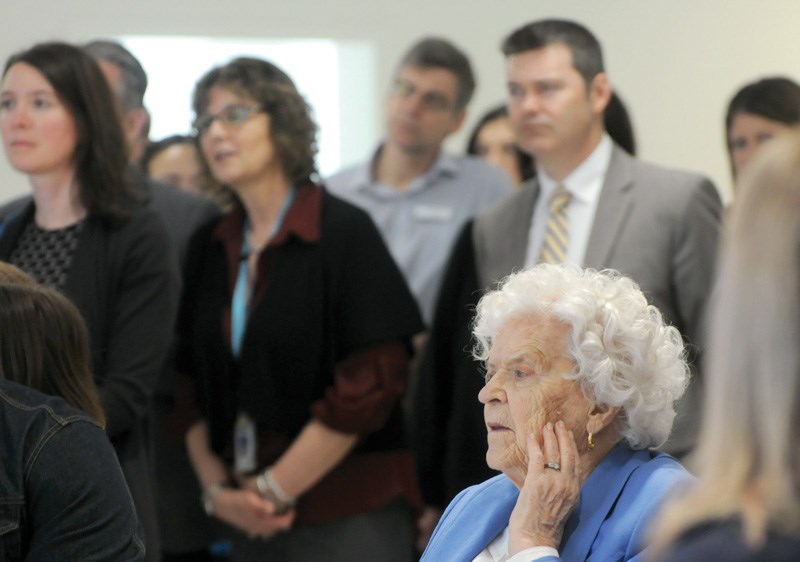A foosball table tucked in a corner of the HOpe Centre’s bright and airy third-floor hospital wing is just one of the outward signs of the new approach to youth mental health care taking place on the North Shore.
But it’s the program that will operate here, starting next week, which offers often-desperate families a lifeline.
On Thursday, health officials marked the opening of a new 10-bed facility for youth with concurrent mental health and substance abuse problems. The new youth facility, the first of its kind in Western Canada and only the second in the country, will offer short stays of between 10 days and three weeks during which patients can be assessed and stabilized.
West Vancouver philanthropists Jack and Leone Carlile donated $2 million last year to kick-start the Lions Gate Hospital Foundation’s $5-million fundraising drive to cover capital costs of the new youth mental health wing. The provincial government has also committed to providing $3.1 million in annual operating costs.
“I do believe we’ll make an impact, a big impact on the lives of patients and their families,” said Dr. Jordan Cohen, medical manager of the new unit and one of three psychiatrists who will work with youth and their families, along with a team of doctors, nurses, social workers.
Treating concurrent disorders in youth at the same time is crucial – yet relatively rare in the medical system, said Cohen, who was previously in charge of a youth in-patient unit at a Calgary hospital.
“Sometimes you can’t tease them apart,” he said. In some cases, substance abuse can bring on mental illness while youth often turn to drugs and alcohol to deal with their mental illness.
Cohen said the new unit will target those youth most in need in local communities, who have exhausted other community mental health resources.
Too often, families struggle to find help until they reach a crisis, said North Vancouver-Seymour MLA Jane Thornthwaite, who is also parliamentary secretary for child mental health. One in five visits to hospital emergency departments stems from mental health problems or substance abuse by youth under the age of 24, said Thornthwaite.
“A family’s world is turned upside down when a child has mental health challenges,” she said.
Deborah Maguire Tucker knows that all too well.
Her son, Owen, died five years ago from suicide, after their family’s 10-year struggle to find the help he needed.
Tucker said her son’s mental health problems started in elementary school, but weren’t recognized until much later.
At 15, her son developed drug-induced psychosis that landed him in the emergency department.
Eventually, he lost hope that his life would change, said Tucker, adding if a facility like the new youth unit had existed then, her son might still be alive.
Tucker said since her son’s death, she’s turned her grief into advocacy for youth mental health services.
“We know early intervention is vital,” said Thornthwaite.
She added a new one-stop shop for youth opening in May in Lower Lonsdale – known as The Foundry – will also provide a range of out-patient services, including mental health support, social services, employment help and assistance with drug and alcohol problems. Vancouver Coastal Health is providing $2.5 million annually towards its operation.
The new Jack and Leone Carlile Centre was built in a previously empty space on the third floor of North Vancouver’s $62-million HOpe Centre, dedicated to the treatment of mental health and addictions, which opened in 2014.
In addition to 10 private rooms, the youth unit includes a dining area, family room, exercise room and space for studying, known as the “think tank” where youth undergoing assessment can continue with school, with help from a full-time teacher.



